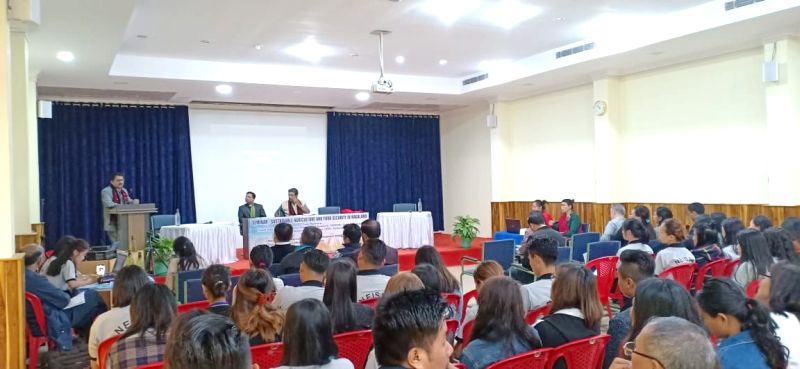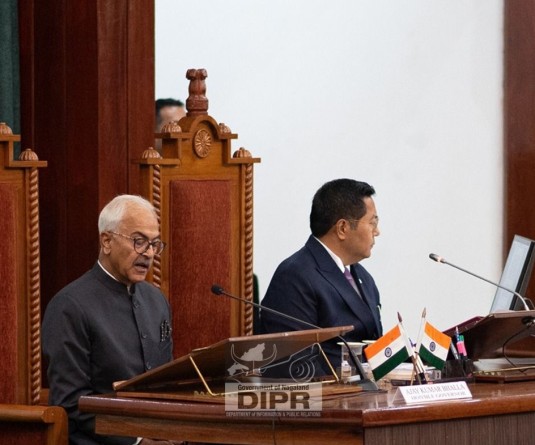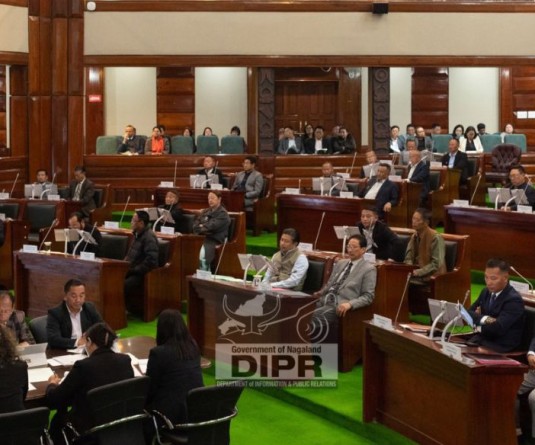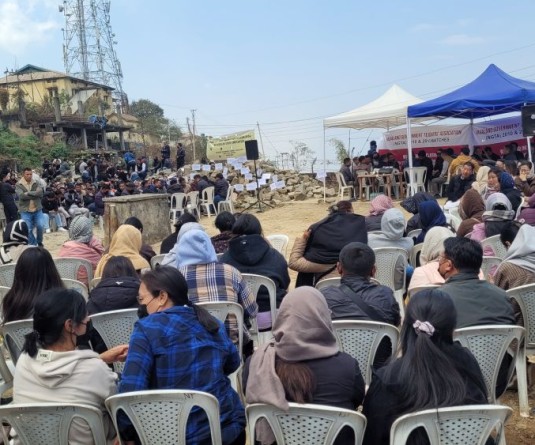1

A section of the participants attending the ‘Seminar on Agriculture and Food Security in Nagaland’ held at DBIDL Hall, Don Bosco Higher Secondary School, Dimapur on February 15. (Morung Photo)
Morung Express News
Dimapur | February 15
With an attempt to explore and expose diverse perspectives on the idea of sustainable agriculture and food security and policies on the ground in the state, a one-day ‘Seminar on Agriculture and Food Security in Nagaland’ was held at DBIDL Hall, Don Bosco Higher Secondary School, Dimapur on Saturday.
Resource persons for the seminar included scholars, community development practitioners, social workers etc.
Shifting cultivation not a threat
Amba Jamir, a well known social and environment activist, policy analyst and development consultant spoke on the topic, ‘Valuing shifting cultivation as a sustainable food production and sustainable resource management system.’ During his presentation, Amba said shifting cultivation in the state should be seen as an opportunity rather than a problem and added that the biggest hurdle is in the way it has been perceived often in a biased and judgemental manner.
“Too much emphasis has been given to the cutting of forests, the burning or the lack of scalable production but not on the richness of knowledge systems, the abundance of agro-diversity, the organic nature of cultivation, the essence of resource management or even from a food and nutrition security perspective,” he said.
He said that shifting cultivation must be understood for what it is and not because of what has been written about it by non-practitioners. However, Amba admitted that there are good and bad or sustainable and unsustainable forms of shifting cultivation. He maintained that shifting cultivation is more than just a system for food production but a comprehensive land-use and management system at the landscape level. “This system might not create much economic values as compared to cash cropping but it is rich in social capital and knowledge systems,” he added.
Amba said that the government, in order to wean away shifting cultivation, had introduced numerous cash crop plantation programmes as well as permanent land use alternatives and commercially viable tree plantations but most of it did not succeed owing to numerous reasons ranging from lack of strategic planning to lack of properly contextualizing the issue.
He said shifting cultivation has sustained communities, the local biological diversity and the institutions that govern and manage local resources. He went on to say that the system continues to provide both food and other resources although at a smaller scale. Amba observed that dependence on the system has reduced as lesser families practice the system leading to reduction in production of local food crops.
He said that the shift to cash crops might have made agriculture more economically productive but biologically poor, the impacts of which may be realised much later.
He called for the need to strategise to transform traditional crops from subsistent food crops to cash crops. Amba said that the approach to dealing with shifting cultivation must be based on social values, traditional practices and institutions and ecological solutions.
‘NE region is natural reservoir of wild edible fruits’
Another resource person, Dr C P Suresh, HoD Horticulture Department, NEHU Tura Campus spoke on ‘Role of horticulture on nutritional security and sustainable development.’ He pointed out that a wide range of tropical, sub-tropical and temperate fruits such as lemon, mandarin, pineapple, passion fruit etc are grown in the northeast region accounting to 5.1% contribution to the national production in terms of fruits. He said out of the 800 different species of wild edible crops in the country, about 300 species are used mostly by the tribal and rural population of northeast.
“This region is the natural reservoir of a number of wild edible fruits,” he said.
Dr Suresh also said that although the wild fruit species are gathered mostly for home consumption, it has been recognized to have potential to meet household food and income security. He called for the need to demonstrate and quantify the benefits of the diversity of the indigenous and underutilized fruits for livelihood and to ensure that such information is put to use widely to increase well-being.
Other resource persons including Dr Azeze Seyie, Dr. Pauline Alila, Dr Samhita Barooah respectively spoke on topics, ‘Agriculture for sustainable development in Nagaland; ICAR Perspective,’ ‘Horticultural contribution to sustainable agriculture and food security,’ and ‘Peripheral ecology and women farmers’ work in hill areas of Nagaland, Meghalaya and Northern Thailand.’
The seminar was jointly organized by North East Institute of Social Sciences and Research, Peace Channel and Henry Martin Institute, Hyderabad.






